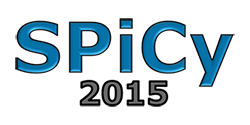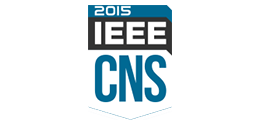 |
1st IEEE Workshop onSecurity and Privacyin CybermaticsFlorence, Italy - September 30, 2015 |
 |
Call for Papers
In the modern age Cybermatics is differentiating itself by designing the physical and social places into the cyber space to accomplish the union of three spaces: (i) Physical Cyberworld, (ii) Social Cyberworld, and (iii) Thinking Cyberworld. In the cyber space, everywhere cyber-nodes are significantly independent from the space-time limitations that exist in the physical space. Along with the development of intelligent systems, Cybermatics has brought a wide area of open issues during the cyber interaction, physical perception, social correlation, and cognitive thinking. Currently, Cybermatics is still in its initial stage, and it is expected that Cybermatics will lead industrialization and IT applications to a new level and will significantly change the way of producing, living, and even thinking of the mankind. Cybermatics will transform how we interact with and control the physical world around us, just in the same way as the Internet transformed how we interact and communicate with one another and revolutionized how and where we access information.
Cyber-physical systems are subject to threats stemming from increasing dependence on computer and communication technologies. Cyber security threats exploit the increased complexity and connectivity of critical infrastructure systems, placing the Nation's security, economy, public safety, and health at risk. This workshop aims to represent an opportunity for cyber security researchers, practitioners, policy makers, and users to exchange ideas, research findings, techniques and tools, raise awareness, and share experiences related to all practical and theoretical aspects of Cybermatics security issues.
Capturing security and privacy requirements in the early stages of system development is essential for creating sufficient public confidence in order to facilitate the adoption of novel systems of Cybermatics such as cyber-physical-social (CPS) systems, cyber-physical-social-thinking (CPST) systems, and cyber-physical-thinking (CPT) systems. However, security and privacy requirements are often not handled properly due to their wide variety of facets and aspects which make them difficult to formulate.
The workshop seeks submissions from academia, industry, and government presenting novel research on all theoretical and as well as practical aspects of Cybermatics.
Topics of interest include, but are not limited to:- Access control in Cyber Physical Systems
- Awareness, training, and simulation
- Data protection in Cybermatics
- Cybermatics security strategy
- Cybermatics security principles
- Cyber security in the secure infrastructure
- Identity management in Cyber Physical Systems
- IP-enabled environment security mechanisms (IPv4 to IPv6 transition)
- Fault tolerance
- Monitoring and real-time supervision
- Man-in-the-middle attack to the data flow in the network
- Malware and cyberweapons
- Network security
- Privacy and security Issues in Cybermatics
- Risk analysis for Cyber Physical Systems
- Security architectures
- Security and privacy in smart metering systems
- Security in the Internet of Things
- Security of critical infrastructures
- Smart grid security
- System security
- Service security
- Third-party key management mechanisms for wearable data devices
- Vulnerability assessment and metrics
Important Dates |
|
| Paper Submission due: |
|
| Notification to authors: | August 3, 2015 |
| Camera ready due: | August 10, 2015 |
Submission Instructions
Submitted papers must not substantially overlap papers that have been published or that are simultaneously submitted to a journal or a conference with proceedings. Submissions should be at most 9 pages in the IEEE 8,5"x11" two-column format (available here). Submissions should not be anonymized. The workshop will also consider short submissions of up to 4 pages for results that are preliminary or that simply require few pages to describe. Papers should be submitted for review through EDAS. Only PDF files will be accepted. Submissions not meeting these guidelines risk rejection without consideration of their merits. Papers must be received by the deadline of July 9, 2015 (11:59 p.m. American Samoa time). Authors of accepted papers must guarantee that their papers will be presented at the workshop.Accepted and presented papers will be included in the IEEE CNS 2015 conference proceedings and also in IEEE Xplore. Distinguished papers will be recommended for the Special Issue on "Cyber-Physical-Social Systems" of IEEE Transactions on Computational Social Systems.
General Chairs |
|
| Laurence T. Yang | St. Francis Xavier University, Canada |
| Jianhua Ma | Hosei University, Japan |
Program Chairs |
|
| Hong Liu | Beihang University, China |
| Ruggero Donida Labati | Università degli Studi di Milano, Italy |
Publicity Chair |
|
| Zahid Mahmood | University of Science and Technology Beijin, China |
| Qingchen Zhang | Dalian University of Technology, China |
Program Committee |
|
| Fuchun Guo | University of Wollongong, Australia |
| Man Lin | St. Francis Xavier University, Canada |
| Hazrat Ali | University of Science and Technology Beijing, China |
| Lei Zhang | East China Normal University, China |
| Peng Xu | Huazhong University of Science and Technology, China |
| Xinyi Huang | Fujian Normal University, China |
| Xuanxia Yao | University of Science and Technology Beijing, China |
| Zheng Yan | Aalto University, Finland |
| Sokratis Katsikas | University of Piraeus, Greece |
| Giovanni Livraga | Università degli Studi di Milano, Italy |
| Olga Gadyatskaya | University of Luxembourg, Luxembourg |
| Wojciech Mazurczyk | Warsaw University of Technology, Poland |
| Luis M. Camarinha-Matos | New University of Lisbon, Portugal |
| Basel Alomair | King Abdulaziz City for Science and Technology, Saudi Arabia |
| José María de Fuentes | University Carlos III of Madrid, Spain |
| Lorena González-Manzano | University Carlos II of Madrid, Spain |
| Hung-Yu Chien | National Chi Nan University, Taiwan |
| David Evans | University of Derby, UK |
| Fengjun Li | The University of Kansas, USA |
| Gang Qu | University of Maryland, College Park, USA |